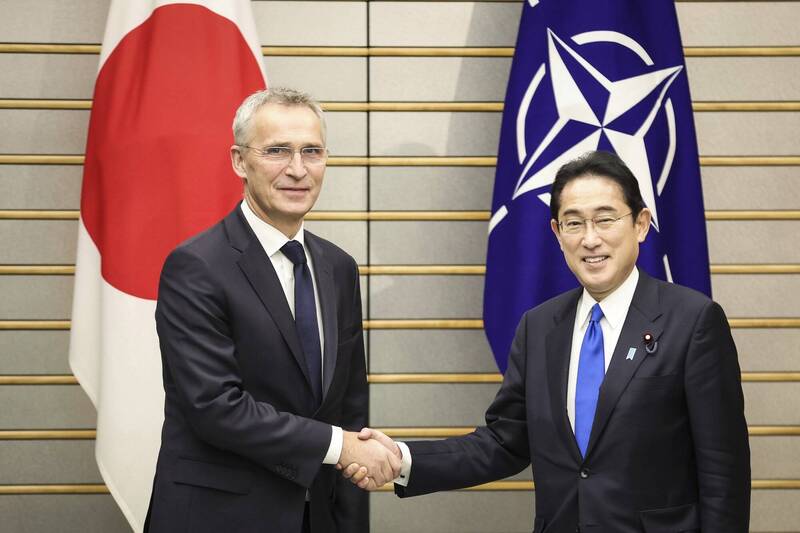NATO Secretary-General Stoltenberg (left) met with Japanese Prime Minister Fumio Kishida (right) tonight. In the press conference after the meeting, Stoltenberg publicly criticized China for "significantly increasing its military power, including nuclear weapons, and threatening Taiwan. ", that it is necessary for NATO and Japan to jointly respond.
(Associated Press)
[Special Commissioner Lin Cuiyi in Japan/Tokyo 31st Report] North Atlantic Treaty Organization (NATO) Secretary-General Jens Stoltenberg is visiting Japan. He held talks with Japanese Prime Minister Fumio Kishida this evening (31st) and confirmed the strengthening of The two sides are cooperating in security.
The two held a joint press conference after their talks. Stoltenberg publicly criticized China for "significantly increasing its military power, including nuclear weapons, and threatening Taiwan," and believed that NATO and Japan must jointly respond.
The NATO Secretary-General visited Japan five years apart, and Kishida welcomed Europe's deepening participation in the Indo-Pacific region during the talks.
The two sides issued a joint statement on security cooperation.
Taking into account the risk of "Taiwan incident" caused by China, the statement emphasized "the importance of peace and stability in the Taiwan Strait, and clearly stated that "nowhere is allowed to change the status quo by force."
Express serious concern about China's military cooperation with Russia.
Please read on...
In addition, regarding China's rapid military build-up and expansion of military activities, the two sides also strongly urged China to increase transparency and cooperate in disarmament.
This is the first time that a description of China's military expansion has been included in a joint document between Japan and NATO.
During the talks, Stoltenberg said that what happens in Europe will also have an impact on security in Asia, and the two sides agree that "European Atlantic and Indo-Pacific security are inseparable".
Stoltenberg highly affirmed Japan's revision of the three national security strategy documents at the end of last year.
This meeting not only confirms that Japan and NATO will strengthen security cooperation, but also increase the level, including cooperation in response to "hybrid warfare" such as the Internet, space and disinformation. Japan is also considering regular participation in NATO's council and chiefs of staff meetings.
Stoltenberg arrived in Japan after finishing his visit to South Korea yesterday. This morning, he visited the Iruma Base of the Air Self-Defense Force in Saitama Prefecture to see Japanese-made C-2 transport aircraft and other equipment.
Since Japan provided support materials to Ukraine last year, they were transported by C-2 transport planes. Stoltenberg expressed his gratitude to the more than 70 Air Force members present. He also emphasized that the war in Ukraine shows that our security is tight. Connected, if Putin wins, it will send a dangerous message to the world that "the use of force will achieve the goal".
Russia's invasion of Ukraine heightened NATO's emphasis on Asian security ties. Leaders of Japan, South Korea, Australia and New Zealand were invited to NATO's leaders' meeting for the first time last June. Kishida warned European nations that "today's Ukraine may become tomorrow's East Asia".
In the "2020 Strategic Concept" released by NATO, Russia poses a direct threat to Europe, while China poses a "systemic challenge" to the rules-based world order, and it is pointed out that "the Indo-Pacific region is extremely important to NATO."
